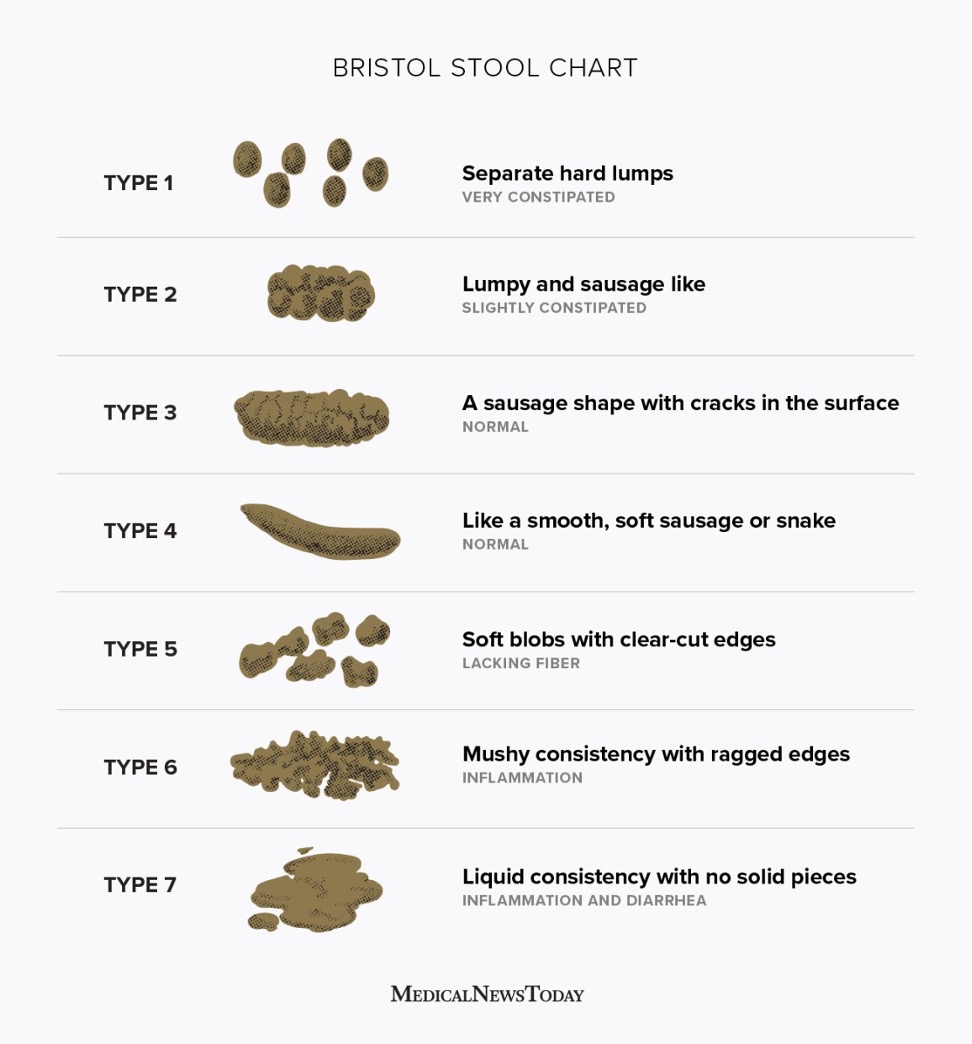

Bowel Movements and Your Health
Regular bowel movements are important for eliminating waste and toxins from the body. Imagine what would happen if you didn’t take the garbage out regularly? It would begin to accumulate and cause problems. Typically, stool is composed of 75 percent water and 25 percent solid matter. Approximately 30 percent of that solid matter comprises deceased bacteria, another 30 percent consists of indigestible food material such as cellulose, 10 to 20 percent accounts for cholesterol and other fats, another 10 to 20 percent includes inorganic substances like calcium phosphate and iron phosphate, and 2 to 3 percent constitutes protein.1
Healthy bowel movements are crucial for maintaining a healthy body, but how can you determine what’s considered healthy? The Bristol Stool Chart is an excellent starting point. It was developed by doctors at the Bristol Royal Infirmary in England and is based on the bowel movements of nearly 2,000 individuals.2


Types 1 and 2 indicate constipation, types 3 and 4 are healthy stool, while types 5–7 suggest diarrhea and urgency.
STOOL COLOUR – Stool contains bilirubin, a reddish-brown substance that results from the breakdown of waste in the liver and bone marrow. Bilirubin is what imparts the usual brown hue to poop.3 Temporary changes in colour can occur if you consume certain foods like beets or dark green vegetables. If you’re concerned about your stool’s colour, consult a healthcare practitioner. Note: If your stool appears bright red or black, it could indicate the presence of blood. In such cases, seek medical attention promptly.
FREQUENCY – The frequency of bowel movements can be influenced by factors like diet, age, stress, hormones, and physical activity. It also varies from person to person. Generally, having bowel movements from 3 times a day to 3 times a week is within the normal range, with once a day being considered ideal.4
GAS AND ODOUR – Gas is a natural by-product of digestion. However, excessive gas isn’t normal, and neither is it being particularly foul-smelling.
SINK OR FLOAT – Normal healthy stool should leave the body easily and gently sink. If it rapidly sinks to the bottom of the toilet, it might indicate a lack of dietary fiber and water. Floating stool could be due to excess fiber, fat, or gas, but it could also signal a gastrointestinal infection or stomach ailment. If your stool frequently floats and feels greasy, consult your healthcare provider.5
EASE OF POOPING – Many people bring reading material or their phone into the bathroom and spend extended time on the toilet. However, healthy bowel movements should be quick, painless, and require minimal effort. Straining excessively can lead to hemorrhoids.6 Consider leaving your phone and reading material outside the bathroom to dedicate focused time for bowel movements.
Here are some tips for maintaining healthy bowel habits:7,8
- Consume less processed and refined foods and incorporate plenty of high-fiber foods into your diet. Even though your body can’t digest fiber, consuming an adequate amount is vital for gut health. Dietary fiber increases stool size and softness.
- Stay hydrated by drinking more water. Dehydration is a major cause of constipation. Ample water is essential for facilitating the movement of food waste through your digestive system. Without sufficient water, stools can become hard, lumpy, and difficult to pass.
- Engage in regular exercise. Consistent physical activity aids in relieving constipation by reducing the time food waste spends in the large intestine. Exercise also enhances blood flow throughout the digestive system.
- Manage stress effectively and establish a regular bowel movement schedule.
- Consider using a pooping stool. Elevating your feet on a stool while using the toilet, putting your body in a squatting position instead of sitting, can aid in effortless stool passage.
- Respond to the urge to defecate promptly, even when you’re away from home. Remember, everyone experiences bowel movements—it’s a natural process.
If you’re struggling with constipation, you might find relief with CleanseMORE® by Renew Life®, a colon support formula containing ingredients like Cape Aloe, Rhubarb, Triphala, Magnesium, Marshmallow Root, and Slippery Elm. It’s non-GMO and free from gluten, dairy, or soy.
Many health experts also suggest taking a probiotic supplement for digestive balance and promoting bowel health. Renew Life® Colon Care™ helps alleviate functional gastrointestinal symptoms like abdominal pain, nausea, gurgling, and flatulence. It also accelerates intestinal transit time. This shelf-stable formula is guaranteed for quality, purity, and potency until expiration. It’s gluten, dairy, and soy-free, as well as non-GMO Project verified.
Written by: Caroline Farquhar RHN, EMP, BA
References:
1. Britannica staff. (2023). Feces. [Online]. Britannica. Last Updated: 23 April 2023. Available at: https://www.britannica.com/science/feces [Accessed 9 August 2023].
2. Leonard, J. (2023). What are the different types of poop?. [Online]. Medical News Today. Last Updated: 10 January 2023. Available at: https://www.medicalnewstoday.com/articles/320938#bristol-stool-chart [Accessed 9 August 2023].
3. Nall, R & Higuera, V. (2023). How often should I have a bowel movement?. [Online]. Healthline. Last Updated: 21 March 2023. Available at: https://www.healthline.com/health/bowel-movement#typical-bowel-movement-frequency [Accessed 9 August 2023].
4. Ibid
5. Villines, Z. and Rees M. (2023). Why does poop float? Is it normal?. [Online]. Medical News Today. Last Updated: 10 January 2023. Available at: https://www.medicalnewstoday.com/articles/325274 [Accessed 11 August 2023].
6. Northrup, C. (2019). How Healthy Is Your Poop? Available: https://www.drnorthrup.com/how-healthy-is-your-poop/. [Accessed 9 August 2023].
7. Mayo Clinic Staff. Constipation Prevention. Available: https://www.mayoclinic.org/diseases-conditions/constipation/symptoms-causes/syc-20354253. [Accessed 9 August 2023].
8. CDHF Staff. (2022). Constipation: What to Do if You Can’t Poop. [Online]. Canadian Digestive Health Foundation. Last Updated: 29 Nov 2022. Available at: https://cdhf.ca/en/constipation-what-to-do-if-you-cant-poop/ [Accessed 11 August 2023].

